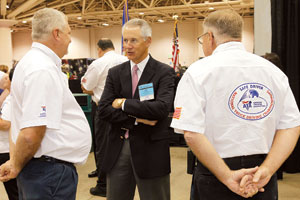Graves: ATA Is Evolving With Changing Industry

This story appears in the June 13 print edition of Transport Topics.
As American Trucking Associations President Bill Graves moves closer to retirement at the year’s end, he believes the federation is “doing fine” as its leadership evaluates how to adjust its focus to serve a fast-changing industry.
Transport Topics spoke with Graves on May 25 about his time leading ATA as well as his Dec. 31 retirement.
In a frank and reflective interview, Graves blended a sense of accomplishment of ATA’s progress since he became president in 2003 with current developments, as policy battles and an evolving industry are forcing the federation to evaluate “what we want to be when we grow up.”
PHOTO GALLERY: The Bill Graves years at ATA
LOOKING BACK AND AHEAD: Graves sees more road-funding battles
Graves said he sees an industry where new executives have emerged to have a greater presence, though often with a somewhat different agenda.
“[XPO Logistics CEO] Brad Jacobs is a fabulously successful guy,” Graves said. “But he’s not an old-school trucker.”
Jacobs, who has made a number of recent purchases, including Con-way Inc., and others like him challenge ATA’s fundamental structure that blends policy advocacy with image programs such as the National Truck Driving Championships and Trucking Moves America Forward, Graves said.
“We are trying to figure out how to satisfy those diverse demands,” Graves said, humorously comparing the process to the “Whack-a-Mole” arcade game.
“It’s causing us to go through an evaluation and look in the mirror,” he said. “Are we as an association as nimble and focused on the right policy items? How to be all things to all people continues to be a challenge. Fleet members want to make sure they are getting the value they expect for their money.”
That issue came to a head over a campaign by large less-than-truckload carriers, which were supported by ATA, to win federal approval for twin 33-foot trailers that would add 18% to their productivity. “We felt comfortable that we were executing on the guidance that had been properly vetted and discussed” by the board of directors, the ATA leader said.
Then, at the 11th hour, some fleets realized that 33-foot trailers actually might happen — unlike many past unsuccessful efforts to improve trucking productivity, he said. And due to the resulting stiff opposition from many truckload carriers, as well as self-styled safety groups, the 33-foot trailer initiative failed.
“That left hard feelings sort of everywhere,” Graves said. “Everybody was mad at everybody. It’s taken a little while for everybody to get over it.”
ATA is now on the sidelines of future efforts to increase truck productivity, left to figure out what’s next.
“We have to ask ourselves what it is going to take to demonstrate value,” Graves said. “I don’t think we have thought about it enough. Change happened quickly. I don’t think we were prepared.”
It was the result of being caught in a family feud, as he put it.
Graves had experienced something similar at the beginning of his tenure with the Trucking Association Executive Council, or TAEC, which is made up of staff executives of state trucking associations and conferences affiliated with ATA.
Graves recalled TAEC leaders attending the organization’s annual meeting telling him that it was “so unusual” to see an ATA president there. The new ATA leader, fresh from two terms as governor of Kansas, interpreted those comments as a call to action.
“There was a critical fracture in the federation,” Graves said. Healing that rift “was the obvious thing to do.”
“It’s healed about as well as it could be” through a concerted effort to align the priorities of ATA and TAEC, he said, adding that ATA still respects state groups that take their own positions.
That alignment was really important, Graves believes, because trucking draws so much strength from “grass-roots” involvement.
As ATA evaluates whether it is as “nimble and focused” on the policy items members expect, it must consider a process that includes such fundamentals as whether the makeup of its executive committee and board of directors make sense and are equitable in a changing industry, Graves said.
While the veteran of more than 13 years didn’t say how he expects ATA to change, he remains positive about three facts:
One is that “ATA still looks like a pretty attractive home” because it offers a wide range of advocacy and other services — “from soup to nuts.”
Another is the fact that “the world is completely different” from trucking as he knew it as a youth “knocking around on the loading dock” of his family’s trucking company.
And the third fact, which hasn’t changed, is the essential nature of trucking.
“We know the economy is going to expand,” and trucks are certainly going to be out there in bigger numbers, he said. “Because we have to be. There is just no other way to move product to where people live, work and recreate.”

